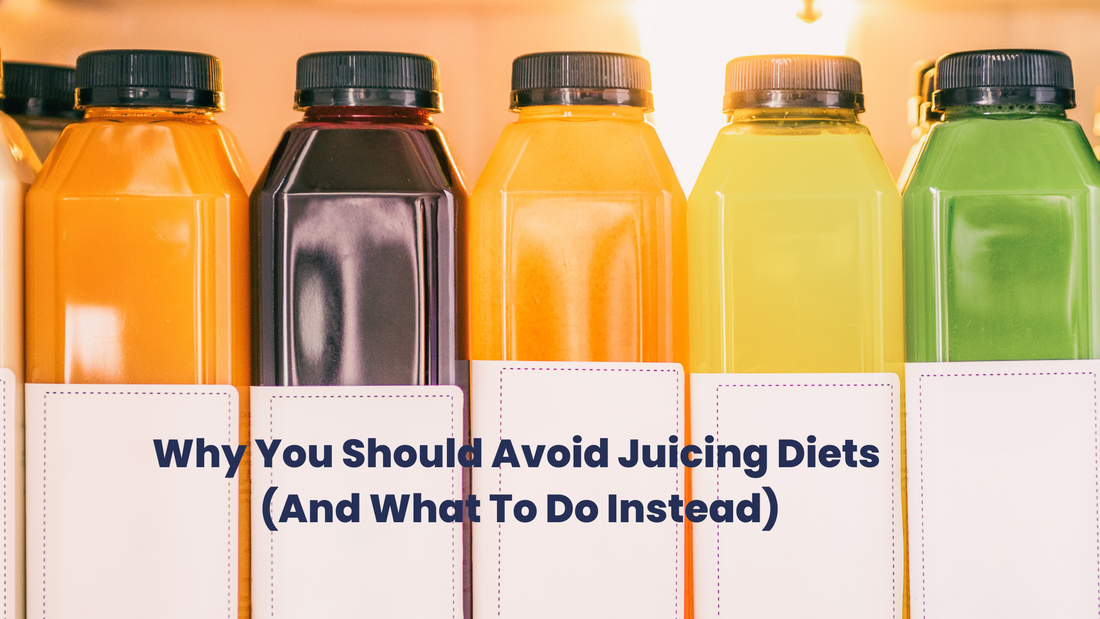
Why You Should Avoid Juicing Diets (And What To Do Instead)
Share
If you're looking to lose weight and improve your health, you may have considered a juicing diet or a juicing cleanse. These diets involve drinking only fruit and vegetable juices for several days or weeks. While they may seem like a quick fix, there are several reasons why you should avoid juicing diets.
You might be thinking: wait, don’t these JUV folks sell a juicer alternative, why are they against juicing diets? Yes, we do sell a juicer alternative, The JUV Press. But, we aren’t against juicing as a practice, we’re just against overconsumptiong in short periods of time - aka juicing diets. Read on and you’ll see why - and what we recomend instead. Spoiler altert: We beleive in balance.
Missing (some) Nutrients
Juicing removes the fiber from fruits and vegetables, which means that you miss out on important nutrients. Fiber is essential for gut health and helps to keep you feeling full. Without it, you may experience constipation, bloating, and hunger pangs.
In addition, juicing removes many of the vitamins and minerals that are found in the skin and pulp of fruits and vegetables. This means that you may be missing out on important nutrients like vitamin C, potassium, and folate.
Juicing diets typically restrict eating to only juices (well, limit it to only drinking juices). And by only drinking juice, you’re avoiding other foods you may have otherwise eaten that contain fiber and the other nutrients you’re not devoid of.
High Absorption of Sugar
Juices because they remove the fiber are relatively higher in sugars. How does this work? Well, fiber typically slows down the digestion process. Specifically, it slows down the absorption of sugar into your bloodstream. So, without it, it can cause spikes in blood sugar levels, which can lead to insulin resistance among other complications.
Lack of Satiety
Juicing diets are often low in calories, which can lead to feelings of hunger and deprivation. In addition, liquid calories are less satiating than solid foods. This means that you may feel hungry even if you have consumed the same number of calories as you would from solid food. This can make it difficult to stick to the diet - including, staying focused and alert throughout the day. And in the worse case, could cause you to binge on unhealthy foods once the diet is over. It’s not different than how when we feel really hungry and finally get access to food, we might over indulge.
Not Sustainable
Juicing diets are not sustainable for many in the long run. For reasons mentioned above, while it does provide a boost of some nutrients, you are missing others, including the fibers. In addition, juicing diets can have long term impacts to your health by missing out on nutrients from other foods.
Alternatives to Juicing Diets
Well, we’re a strong believer in balance. Our entire ecosystme, including our bodies, are based on balance. Overindexing on one thing throws the whole system off tilt. So, here are some recommendations to finding balance in your healthy lifestyle:
- Incorporate juicing as a part of your daily routine, rather than relying solely on juices for your nutrition. In other words, use juicing as supplement than a replacement.
- Limit your juice intake to one or two servings per day and make sure to include whole fruits and vegetables in your diet as well.
- Choose fruits and vegetables with low sugar content to avoid spikes in blood sugar levels.
- Experiment with different juice recipes that include a variety of fruits and vegetables to ensure you're getting a range of nutrients.
- Consider adding protein sources like nuts or seeds to your juices to help keep you full.
- Be mindful of your calorie intake and try to balance your juice intake with other healthy foods throughout the day.
- Start slow – Instead of jumping right into a full-fledged juicing diet, try adding one or two juices to your daily routine. This will also help you get accustomed to the taste of freshly squeezed juices without overdoing it.
And as always, consult with a healthcare professional or registered dietitian if you have any concerns or questions about incorporating juicing into your diet.
Conclusion
In conclusion, while juicing diets may seem like a quick fix to losing weight and improving health, they come with many potential downsides. They can lead to nutrient deficiencies, high absorption of sugar, lack of satiety, and are not sustainable in the long run. However, this does not mean that juicing should be avoided altogether. Incorporating juicing as a supplement to a balanced diet and lifestyle can provide many benefits.
By following the recommended tips, such as limiting juice intake, choosing low-sugar options, and experimenting with different recipes, you can find a healthy balance that works for you. Remember, slow and steady wins the race, and incorporating one or two juices into your daily routine is a great way to get started on a path to improved health and wellness.
